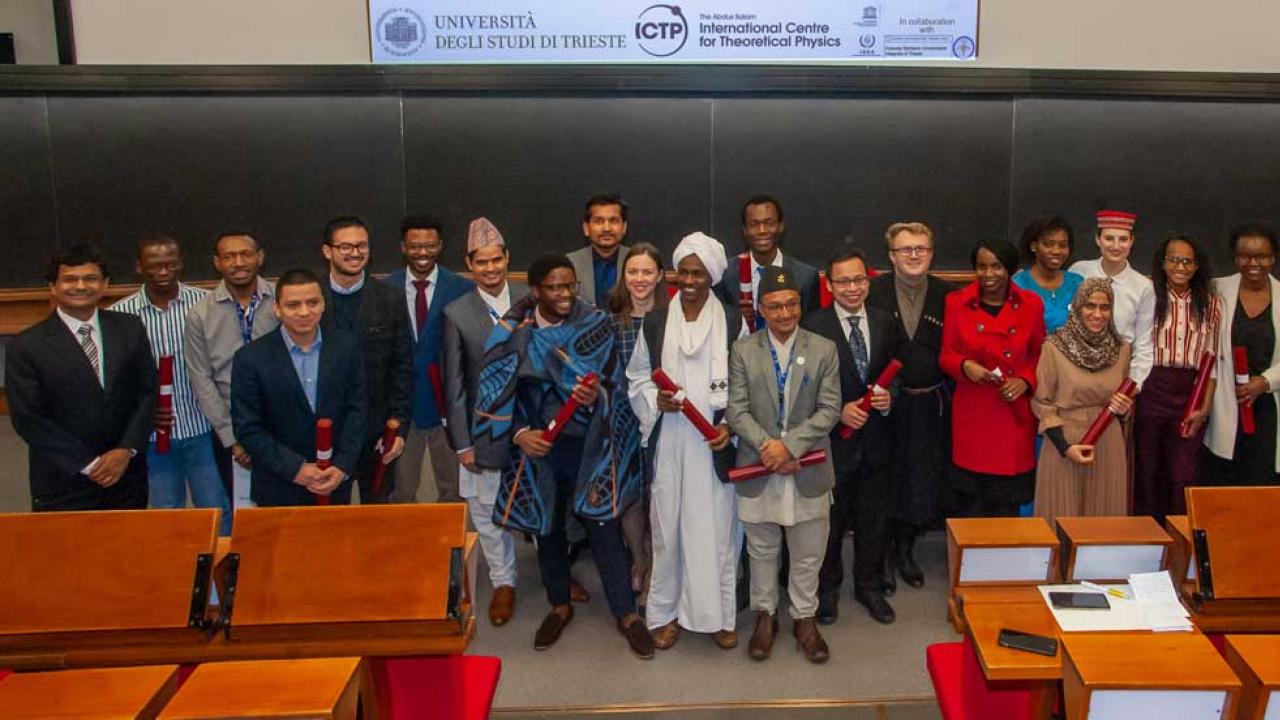
Theoretical physics does not always remain on a blackboard or in an academic paper: the rigorous theoretical training that students of ICTP's Masters in Medical Physics (MMP) programme receive is put to use clinically in hospitals all over the world as the basis of quality patient care. A joint programme between ICTP and the University of Trieste, the programme graduated its fifth class of students on 12 December, with 20 students from 18 countries presenting their thesis work, receiving their diplomas, and preparing to return to their home countries with extensive new knowledge.
Medical physicists are key members of diagnostic and treatment teams at hospitals everywhere; they bring their knowledge of techniques, tools, and theory to design therapies to address a very wide range of health conditions. The ICTP-University of Trieste programme offers young medical physicists working in developing countries the opportunity to spend two years expanding their skill sets and theoretical foundations in Italy. The first year is spent in Trieste taking classes, and during the second year each student learns how that knowledge is applied in one of a network of participating hospitals across Italy.
Professor Luciano Bertocchi, who coordinates the programme along with Renato Padovani, both ICTP scientists, reflected on the growth of the programme as he opened the graduation ceremony this week. “Today, the fifth class of students will graduate from the programme. In January, students in the sixth class will head to hospital placements, and we will welcome the seventh class of medical physics masters students, bringing the total number of students in the programme to 122, from 58 countries.”
ICTP Director Atish Dabholkar was on hand to award degrees and help honor the students’ hard work. “One of the nicest things about ICTP is you really see this rainbow of people from all over the world, dressed in very nice traditional clothes,” he said.
“In the quest for better health and healthcare,” said Professor Giovanni Comelli, representing the University of Trieste, “it is important to develop new tools, new techniques, new instruments, to build new facilities, but beyond that it is crucial to have people trained in using these new facilities, instruments, and techniques.” Many cancer patients in low-income countries do not have access to the newest radiotherapy treatments, and often have little access to any care. The MMP aims to help these patients by providing training to their carers, and not only that: the network of fellow professionals students formed during the Masters programme will be beneficial in their future careers. These connections can help knowledge spread continually and help new medical physicists to get quality training, enhancing the quality of care patients receive.
“Remember that in order to remain at the top of the profession, you have to realize that lifelong learning is key,” said Deborah Van der Merwe, the head of the Medical Physics Division at the International Atomic Energy Agency (IAEA), one of ICTP's UN sponsors and a key partner to the MMP programme. She noted that the IAEA is very pleased to collaborate on and support the MMP programme, highlighting how much nuclear science can contribute to improving human health.
One of the graduating students, Sanchez Palmer of Jamaica, summed up the spirit of the MMP programme eloquently: “Sixty years ago, Abdus Salam had a dream of physicists all over the world sharing knowledge. I think everyone in this room can be proud that we are a living testament to that dream.”
















